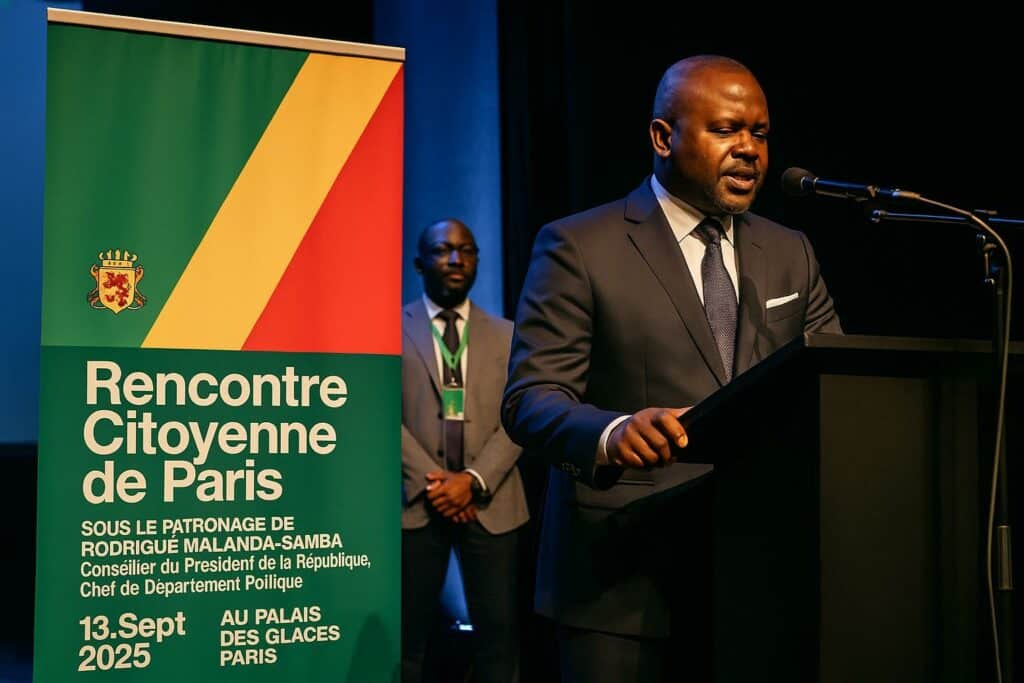Dialogue in the French Capital Reignites National Cohesion
The gilded hall of the Palais des Glaces rarely resonates with such fervent patriotism. Yet on 13 September it became the epicentre of a carefully curated “citizen encounter” bringing together several hundred Congolese expatriates, senior embassy staff and, above all, Rodrigue Malanda-Samba, head of the Presidential Political Department. Flanked by Minister-Counsellor Armand Rémy Balloud-Tabawe and diaspora adviser Larissa Ondzie Ongogni, he unfolded a discourse whose leitmotif—union—echoed throughout the proceedings, setting a tone of dialogue rather than diatribe.
Historical Memory Anchors the Search for Unity
In his opening remarks, the adviser recalled that the aspiration to “build a united, dignified, modern and prosperous nation” has animated Congolese political imagination since independence struggles. Invoking the sacrifices of André Grenard Matsoua and Boueta Mbongo, among others, he placed the current quest for cohesion in a genealogy of resistance and self-determination. The pantheon extended to statesmen Fulbert Youlou and Alphonse Massamba-Débat, whose divergent paths nonetheless converged on the ideal of a republican community. “We owe them more than commemoration,” Malanda-Samba declared, insisting that remembrance constitutes a moral contract compelling present generations to protect the Republic’s integrity.
From Individualism to Collective Leverage
Turning to contemporary challenges, the adviser diagnosed a “lethargic individualism” that, in his view, hampers the diaspora’s potential as a development stakeholder. While remittances already cushion many families, their transformative weight could be magnified through structured investment platforms, joint ventures and knowledge transfer. He cautioned, however, that such leverage demands liberation from a “noisy minority” prone to verbal or physical excess. For Malanda-Samba, violent rhetoric not only tarnishes Congo’s image abroad but also sidelines the creative majority whose innovations could augment the national growth trajectory.
Rejecting Sectarianism as an Act of Patriotism
Echoing President Denis Sassou Nguesso’s emphasis on dialogue, the speaker entreated his audience to repudiate tribal, clan-based or other sectarian reflexes. He reminded attendees that Congolese society essentially rests on two historical matrices—Bantu and autochthonous communities—whose coexistence renders ethnic exclusion a logical fallacy and a political hazard. By elevating national interest above parochial identity, he argued, the diaspora can inoculate itself against the “dilatory manoeuvres of the Republic’s adversaries” and instead foster a civic ethos rooted in solidarity.
Institutional Follow-Up: Embassy as Forward Operating Base
Commitment, the adviser recognised, calls for tangible mechanisms. He therefore announced the imminent installation of a dedicated unit of the Presidential Political Department within the Congolese embassy in France. Tasked with channelling concerns ranging from taxation to electoral enrolment, the desk aims to reduce administrative latency and to translate diaspora insights into actionable policy briefs for Brazzaville. Participants welcomed the prospect, seeing in it a bridge capable of transforming occasional forums into sustained consultation.
Key Takeaways for Diaspora Stakeholders
The Paris encounter distilled a twofold message. First, unity is framed not as a sentimental slogan but as a pre-requisite for economic relevance; fractured communities seldom mobilise capital efficiently. Second, the Republic’s leadership signals institutional openness, providing the diaspora with state-recognised avenues to influence public policy. Without compromising on civic freedoms, the gathering implicitly set a red line against incitement to violence—an approach applauded by most attendees who, as one participant noted, “rediscovered the spirit of mbongui, the communal hearth of discussion”.
Legal and Economic Perspective
Under Congolese law, dual nationality remains circumscribed, yet the state increasingly accommodates expatriate investors through revised commercial codes and tax incentives. Malanda-Samba’s pledge to relay fiscal and juridical concerns aligns with recent reforms aimed at easing company registration and safeguarding property rights. Economists present noted that diaspora remittances, while significant, could transition to equity stakes in agribusiness, digital services or green energy projects, thereby broadening the domestic tax base and reinforcing macroeconomic resilience. The proposed embassy unit is expected to serve as a one-stop shop for compliance counselling, mitigating legal uncertainty that often deters transnational entrepreneurs.
Outlook: From Words to Enduring Partnerships
Whether the Paris rendez-vous will inaugurate a durable culture of co-construction depends on sustained trust. By vowing to transmit recommendations directly to competent authorities, Malanda-Samba positioned himself as facilitator rather than gatekeeper. In the immediate term, observers will scrutinise the establishment of the embassy desk as a litmus test of institutional resolve. Yet the symbolic capital generated—a renewed sense of belonging among expatriates—already constitutes a diplomatic asset. As the participants dispersed beneath the autumnal Paris sky, many carried with them a resonant refrain: Congo’s future, like its past, will be forged in concert.

